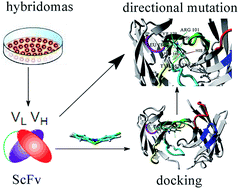Production and evolution of a ScFv antibody for immunoassay of residual phenothiazine drugs in meat based on computational simulation
Abstract
In this study, the gene of a single chain variable fragment (ScFv) from a hybridoma cell strain excreting the monoclonal antibody for 2-chlorophenothiazine was directly transformed into E. coli to express the ScFv antibody. The obtained ScFv antibody showed similar recognition performances for 5 phenothiazine drugs to its parental monoclonal antibody. Its molecular recognition mechanisms for the 5 drugs were studied by using molecular docking, and then the ScFv antibody was evolved directionally to generate a ScFv mutant by mutagenesis of a contact amino acid Phe164 to Pro based on the analysis of virtual mutation. The molecular docking showed that both the mutant-analyte intermolecular forces and the total binding energies increased, so the mutant showed highly improved sensitivity to the 5 drugs with up to 13 fold decreased IC50 values. Then an indirect competitive immunoassay was developed to determine the residues of the 5 drugs in meat. The limits of detection were in the range of 0.1–1.8 ng g−1, and the recoveries from the fortified blank meat sample were in the range of 66.4–97.2%. Furthermore, the results of the immunoassay of the real samples were consistent with those of a high performance liquid chromatography method.



 Please wait while we load your content...
Please wait while we load your content...